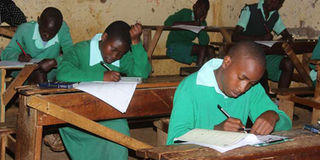As a matter of policy, what exactly does our education system aim at?

Candidates in Eldoret town, Uasin Gishu County, tackle their Mathematics paper during KCPE examination on November 10, 2015. But what we churn out of the classroom every year are youngsters who are barely literate concerning almost all social questions. FILE PHOTO | NATION MEDIA GROUP
What you need to know:
- In my other field of competence – English – I am perennially disappointed that the intensity of mastery of that language is getting looser and looser every year.
- Let me reiterate it: If our mastery of English is getting looser and looser nationwide, the parent and the teacher are the culprits.
What masquerades as education swallows up a huge percentage of all our national savings every year.
If I hadn’t gone to school, I would never have become a journalist.
You can generalise that statement as follows: In any human society, the school is the taproot of every profession.
That is why I reiterate what I have often said here: It is that, in our country, teaching is the most thankless, most poorly rewarded, national task.
That is a tragic commentary on the thinking of those in charge of our national development planning, especially those whose task it is to reward service all round.
However, the opposite is also true. This is also the chief shortcoming of those who represent that profession in their struggles with Kenya’s national employer of teachers.
Like the leaders of the Kenya Union of Journalists (when I edited one of the Nairobi dailies), they have a fixation with the idea that their wages and salaries be raised heftily every year – and spend a great deal of energy on demanding it – even as they make not a single effort to improve their skills so as to merit such increments.
In my other field of competence – English – I am perennially disappointed that the intensity of mastery of that language is getting looser and looser every year.
It was of our own volition that, through our nationalists, we made English our official tool of national communication in tuition, at work and in governance.
Thus all our children begin speaking English at a very young age.
But, if – like me – you enjoy playing with children and are equally concerned about language, you will be thoroughly dismayed that our children speak such terrible English.
But here is the nitty-gritty. Human children are born copy-cats.
If their language is poor, two kinds of individuals are the ones to blame.
THE CULPRITS
The first is the parent. The second is the schoolteacher.
Let me reiterate it: If our mastery of English is getting looser and looser nationwide, the parent and the teacher are the culprits.
Day in and day out, our children – the excellent copycats that all human children are – have to listen to the increasingly rotten grammar and faulty diction of their fathers, their mothers, their teachers.
However, I latch onto English only because it is what I also teach.
But, although I do not teach mathematics or biology, I can, from what has happened to English, imagine how perpendicularly the teaching of all other subjects must also have plunged ever since the Education docket fell into our own national hands in 1963.
That is why I blow a raspberry at the likes of Mr Wilson Sossion, the secretary-general of one of Kenya’s unions of teachers.
He makes it a profession to deafen our ears every day that the sun rises with hefty demands from the Treasury for his wards but has never demanded from those same wards any equally “hefty” improvement in terms of knowledge and how to impart it.
EDUCATION'S RELEVANCE
What masquerades as education swallows up a huge percentage of all our national savings every year.
But what we churn out of the classroom every year are youngsters who are barely literate concerning almost all social questions, individuals barely skilled in social service, social impartment and social management.
That is the question that our ministry of Education poses to us every time the newspapers publish the results of certain examinations.
What had been taught? How had it been taught? How had it been examined?
Had the examiner posed questions that demanded skill in social analysis and concern for national welfare?
Or had the examiner posed only mechanical questions?
Had he or she demanded only a “yes” or “no” for an answer to each question?
As a policy, what exactly does our education system aim at?
To create moral and intellectual creators, or to mould by hand only robots of labour, individuals completely incapable of any creation of their own?





